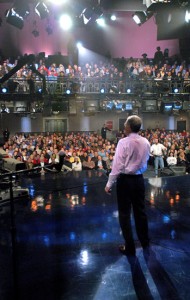David Letterman is about to retire after thirty-three years as a late-night TV host, and he’s marked the occasion by giving a genuinely revealing interview to the New York Times:
I’m awash in melancholia. Over the weekend, I was talking to my son, and I said, “Harry, we’ve done like over 6,000 shows.” And he said, [high-pitched child’s voice] “That’s creepy.” And I thought, well, in a way, he’s right. It is creepy….I’ll miss it, desperately.
My guess is that he’ll miss it more than we’ll miss him. I remember when Letterman was still fresh and original—quite startlingly so—but that was a long, long time ago. Now he’s sixty-eight years old, and he’s outlived the conventions that he used to mock, as well as the new ones that he helped to create. Indeed, he’s come very close to outliving network TV itself.
 For that we should, I suppose, feel nostalgic, but I find it impossible to feel any sentiment at the fast-approaching departure from the scene of a public personality whose stock-in-trade has always been the unfelt snarkery that I call “Irony Lite.” Aside from everything else, I don’t associate him with what I think of as my youth: I was already out of college and earning a living when he launched Late Night with David Letterman in 1982.
For that we should, I suppose, feel nostalgic, but I find it impossible to feel any sentiment at the fast-approaching departure from the scene of a public personality whose stock-in-trade has always been the unfelt snarkery that I call “Irony Lite.” Aside from everything else, I don’t associate him with what I think of as my youth: I was already out of college and earning a living when he launched Late Night with David Letterman in 1982.
What now strikes me most forcibly about his retirement is the very thing for which his own son twitted him. As I wrote in this space apropos of Johnny Carson’s death in 2005, Letterman has
devoted most of his adult life to that most ephemeral of endeavors, hosting a late-night talk show….I wonder what [Carson] thought of his life’s work? Or how he felt about having lived long enough to disappear into the memory hole? At least he had the dignity to vanish completely, retreating into private life instead of trying to hang on to celebrity by his fingernails. Perhaps he knew how little it means to have once been famous.
Perhaps David Letterman knows that, too. For in the end, having done six thousand episodes of a late-night talk show scarcely comes to more than having showed up for work six thousand times in a row. And while it is no small thing to have earned your living honestly, all that matters in the end is what you did with the living you earned.
Knowing nothing of Letterman’s private life, I can’t express an informed opinion about the latter question. Yet I can’t help but think of The Unknown Citizen, W.H. Auden’s sharp-toothed elegy for a machine-age American who “served the Greater Community” with robotic exactitude: Was he free? Was he happy? The question is absurd:/Had anything been wrong, we should certainly have heard. (That’s real irony.)
I note with interest that the word “proud” is nowhere to be found in Letterman’s New York Times interview. Is that significant, or merely characteristic? Maybe it’s just honest.
